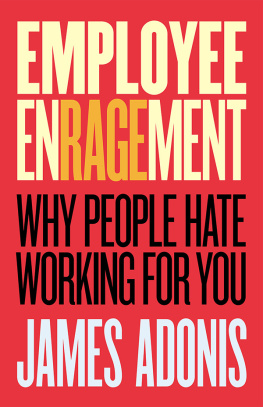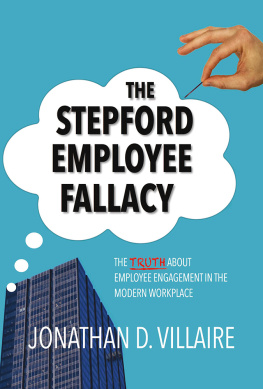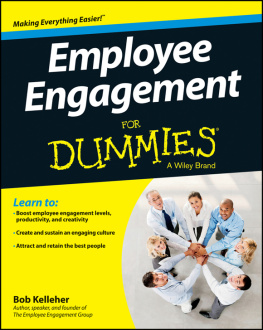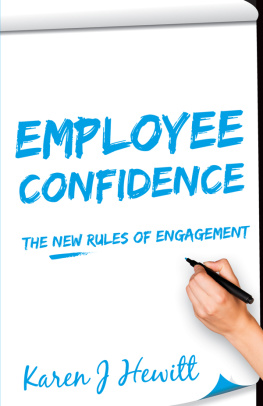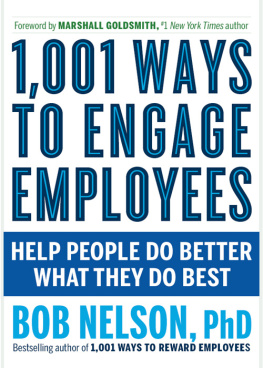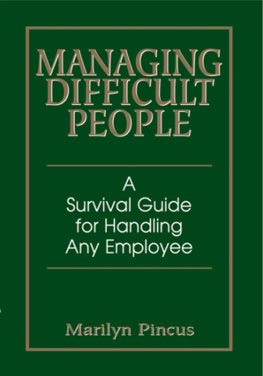Published by Nero,
an imprint of Schwartz Publishing Pty Ltd
Level 1, 221 Drummond Street
Carlton VIC 3053, Australia
www.nerobooks.com
Copyright James Adonis 2016
James Adonis asserts his right to be known as the author of this work.
ALL RIGHTS RESERVED.
No part of this publication may be reproduced, stored in a retrieval system, or transmitted in any form by any means electronic, mechanical, photocopying, recording or otherwise without the prior consent of the publishers.
National Library of Australia Cataloguing-in-Publication entry:
Adonis, James, 1979, author.
Employee enragement: why people hate working for you / James Adonis.
9781863958462 (paperback)
9781925435078 (ebook)
Quality of work life.
Job satisfaction.
Work environment.
Communication in personnel management.
658.312
Cover and text design by Tristan Main
INTRODUCTION
People underestimate the influence that managers have on their employees. What you say and do changes moods, alters lives, shapes personalities, forges careers, inspires performance, and lights the way. Whether youre a Team Leader or a CEO, you are privileged to serve in such a special capacity.
The fact that this book is in your hands is proof that you care enough about the impact you make or hey, maybe its just an easy tax deduction, a dud gift, or something else youll place on your shelf with the other books you havent read. Regardless, I thank you for trusting me to guide you through this process.
Employee Enragement: Why People Hate Working for You is based on a study of 2,400 employees who were asked: What makes you angry, upset, or frustrated at work? And they didnt just share they shouted!
About 40 per cent of the respondents were in Australia, another 40 per cent were from the United States, and the rest were spread across other parts of the world. In this book, I expand on the top factors that employees dislike at work, beginning at 50 and counting down to 1.
I recommend you visit my website jamesadonis.com and click on With Compliments where there are free e-books for you to download on how to attract, engage, motivate, and retain your employees.
Wishing you success at work and in life,
James Adonis
#50
MOOD SWINGS
Mood swings. We all have them. One minute were cheerful, the next minute were sad and sometimes for the most insignificant of reasons. It might be the weather, something someone said, or the fact youre still single (that one gets me every time).
Whatever the reason, our moods are impacted. Our body language changes from open to closed, our words change from happy to snappy, and our tone changes from nice to abrupt. We go from Dr Jekyll to Mr Hyde and then back again.
The question is this: how do you want your employees to feel after theyve had contact with you? If you dont care, then perhaps this isnt the right profession for you. Try horse whispering.
But if you want your employees to walk away from every encounter they have with you feeling better about themselves, better about their abilities, and better about their jobs basically, if you want the impact you make to be one where people are better off just by being within your team then youve got to rise above mood swings. Remember, youre always being watched. Spooky, but true.
Whenever youre in a bad mood, think of something that makes you laugh; write down five things youre grateful for; go for a walk to clear your head; get some exercise; play uplifting music; have a joke book nearby; indulge in stuff that makes you feel better like massages or chocolate; and speak positively.
#49
CARE AND COMPASSION
Caring is so interesting to observe. We take greater care of our cars than we do of our bodies. We care more about giving advice than taking it ourselves. We care more about what we dont have than what we already possess. And that same care factor is evident at work. For example, we care more about achieving performance targets than about the employees wholl deliver them.
The reason this mentality exists is because managers are still managing 1970s Style. If youre no longer wearing flared pants with bright flower prints, driving a Mustang, and watching The Brady Bunch, then dont hang on to the old-school style of management. Managers who werent even born in the 1970s manage 1970s Style because thats how theyve been taught.
Back in the 70s, jobs were rare and candidates were plenty, so managers had the power. They could get away with being uncaring. But now there are fewer candidates and jobs galore, so its employees who have the power. And they know it. Theyre aware that if they dont have a manager who cares, they can resign today with the confidence theyll easily find one who does.
View your employees as volunteers, rather than as workers; ask them what they need to be more engaged; check up on them regularly to see how theyre going; listen to them more; and genuinely appreciate them. If you dont care for and show compassion towards your employees, theres no reason why they should do so for your customers.
#48
LATENESS
I had a job once where I came to work on time on only 14 occasions in 18 months. The remaining 376 days I arrived anywhere between ten minutes and two hours late. It wasnt so much that I was chronologically challenged; its just that I hated this job to such a degree that I would rather chew on razorblades than be there.
I was lucky no-one ever really noticed. Upon handing in my resignation, my boss said: I had a feeling you werent happy when you came in late once or twice. Once or twice?
People are smart enough to know the impact of coming in late. And yet so many of us continue to guiltily sneak up to our desks without saying hi to our workmates in the hope theyll think weve been there all day.
There are two facets to this: you being the late one, and your employees being the latecomers. If youre the latecomer, take a look at the ten most recent times youve been late. Write down the reason why you were late for each occasion and youll notice a pattern emerging. Then take action.
As for your employees, offer incentives for coming on time, provide flexible work options, and penalise the chronic latecomers. Also, employees who love their work are usually early rather than late, so utilise your employees natural talents at work, and provide them with challenges, variety, autonomy, and feedback all of which are the ingredients for job satisfaction.
#47
POOR PERFORMANCE MANAGED POORLY
When I was young, my parents would smack me. Before you judge them, they were (and still are) the most exceptional parents anyone could ever have and I love them dearly, but they preferred to discipline their children in the way many Greek parents do. Id get smacked in the shopping mall, smacked in the playground, smacked at parties, and there were even times my dad would stop the car on the side of the street just to lend us a hand.
Now, to be perfectly honest, the smacks were never painful. But boy, were they embarrassing. And when my sisters and I would turn red, it was never due to the force of my parents hands, but due to the shame of being disciplined in public.
At work, so many managers smack their employees. Not literally, of course, but figuratively. Theyll give negative feedback in front of others; theyll use harsher penalties than necessary; theyll pass judgement on someones performance before first asking the employee what might be causing it; theyll demand what they expect but not provide guidance on how to achieve it.

